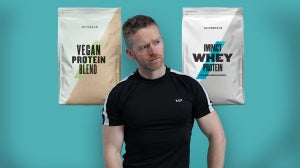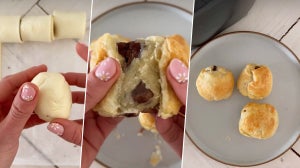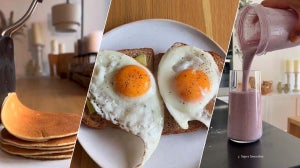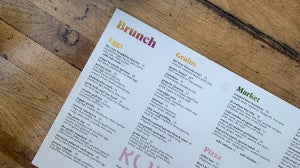
The 8 Best Weight Loss Nutrition Tips
The "secret" to losing weight is simply to consume fewer calories than you burn daily. It looks simple - In reality, however, there’s more to losing weight than just calorie counting. Protein sources, food choices and cooking methods also need to be taken into account. That’s why it can be extremely difficult for a beginner to win the war against the scale.
If you are tired of meal replacement diets and weighing yourself constantly and always looking at the same number on the scale, this article may be just the thing for you. Here's a list of the 8 best weight loss nutrition tips that will help you achieve your ideal weight. These points are small changes that can generate massive results.

1) Go for High-Fibre Carbohydrates.
When it comes to weight loss people often tend to go down the low carb or high carb low-fat route. But by cutting out your carbs you are cutting out an essential macronutrient for weight loss. First and foremost, it's important to be aware that there are two different types of carbohydrates- simple and complex. Simple carbohydrates are fast releasing simple sugars which are a primary source of energy and complex carbohydrates are foods such as rice and pasta which are low in sugar and provide a sustained release of energy.
When it comes to weight loss, choose low-calorie fibre-rich foods that fill you up for longer and keep you away from unhealthy snacks. Go for whole grains (such as brown rice, wholemeal bread and oats) and legumes (such as lentils and beans).
2) Don't Skip Meals.
If you think skipping meals will do any good to your weight loss goal, think again. One of the main reason low-calorie diets are only short term is that you cannot live and function properly on under 1200 calories a day over prolonged periods of time. The human body has very intelligent adaptive mechanisms in order to preserve itself and survive. Whenever you skip a meal, you're basically saying to your body: "Don't spend too many calories".

Your body understands this and will reduce its metabolism to defend against the reduced calorie intake. This means you will be burning fewer calories than you'd normally spend. The bottom line here is that skipping meals has the opposite effect on weight loss that you intend it.
3) No Fizzy Drinks Allowed. [/su_heading]Fizzy drinks are great examples of what we would call “empty calories”. In other words, foods that are mostly packed with simple sugars that offer no additional nutrition benefits besides instant energy. Drinking a full 330 ml of fizzy drinks is equivalent to having 6 to 8 tablespoons of sugar. That's roughly 140 calories with no added vitamins or minerals.

You might be asking yourself why consuming fruit in the form of juice would be bad for weight loss purposes. Although fruits are packed with important vitamins and minerals, remember that they also contain calories.
A small orange has roughly 10 grams of carbohydrates (fructose). Let's think about this for a moment: how many oranges are needed to make a full cup of juice? Three or four. That means that a single cup of orange juice can contain 30 to 40 g of carbohydrates. That's 120 to 160 calories in just a single cup. Choose eating the fruits instead.

Green tea and coffee have fat-burning properties (theine and caffeine, respectively). Research shows these two drinks can reduce abdominal fat and improve body composition (*1), (*2). What's more, green tea contains polyphenol chemicals called catechins which are thought to possess antioxidant properties!
6) More Fat. Fewer Carbohydrates.
It may seem counterproductive to eat more dietary fat in order to lose body fat but that’s actually how things work in nutrition. There are a plethora of studies demonstrating that low-carbohydrate diets are far superior to low-fat diets on weight loss (*3), (*4), (*5).
This is because your body will have to rely more on fat rather than carbohydrates in order to fuel itself. If your muscle glycogen stores (the form in which carbohydrates are stored) are always full (because you're following a high-carbohydrate diet), then the body will have no need to use fat as fuel.

A cheat meal generally refers to a high-fat and high-carbohydrate meal (junk food, in most cases) that breaks down with the normal diet plan. Having a weekly cheat meal can, in fact, favour weight loss.
The body's metabolism is generally reduced on hypocaloric diets. A cheat meal will boost metabolism and ensure the body keeps burning calories at a higher rate. Just make sure a cheat meal doesn't turn into a cheat weekend or cheat week, it's easy to overindulge on foods we crave most, so decide in advance which food you want to have for your cheat meal.
8) Drink Plenty of Water. [/su_heading]Water can not only reduce food cravings but can also help remove toxins and stored fluids in the body. Besides, water takes part in all metabolic processes and is therefore needed for the proper functioning of the body. Without an adequate supply of water, none of the previous tips matter.

Conclusion
These are simple but powerful tips that will help you achieve the necessary caloric deficit threshold in order to lose weight efficiently. If you are struggling to lose weight, first double-check your diet plan to make sure you've made the right food choices. Second, make sure you're not making any of the mistakes mentioned above.
Believe in yourself, persist with your goals and you'll be on the right path to achieve the results you've been chasing.
References:
(*1) - Obesity (Silver Spring). 2010 Apr;18(4):773-9
(*2) - Food Science and Biotechnology, August 2010, Vol. 19(4), pp 1077-1081
(*3) - J Pediatr. 2003 Mar;142(3):253-8
(*4) - N Engl J Med. 2003 May 22;348(21):2082-90
(*5) - Arch Intern Med. 2004 Oct 25;164(19):2141-6
Our articles should be used for informational and educational purposes only and are not intended to be taken as medical advice. If you're concerned, consult a health professional before taking dietary supplements or introducing any major changes to your diet.









